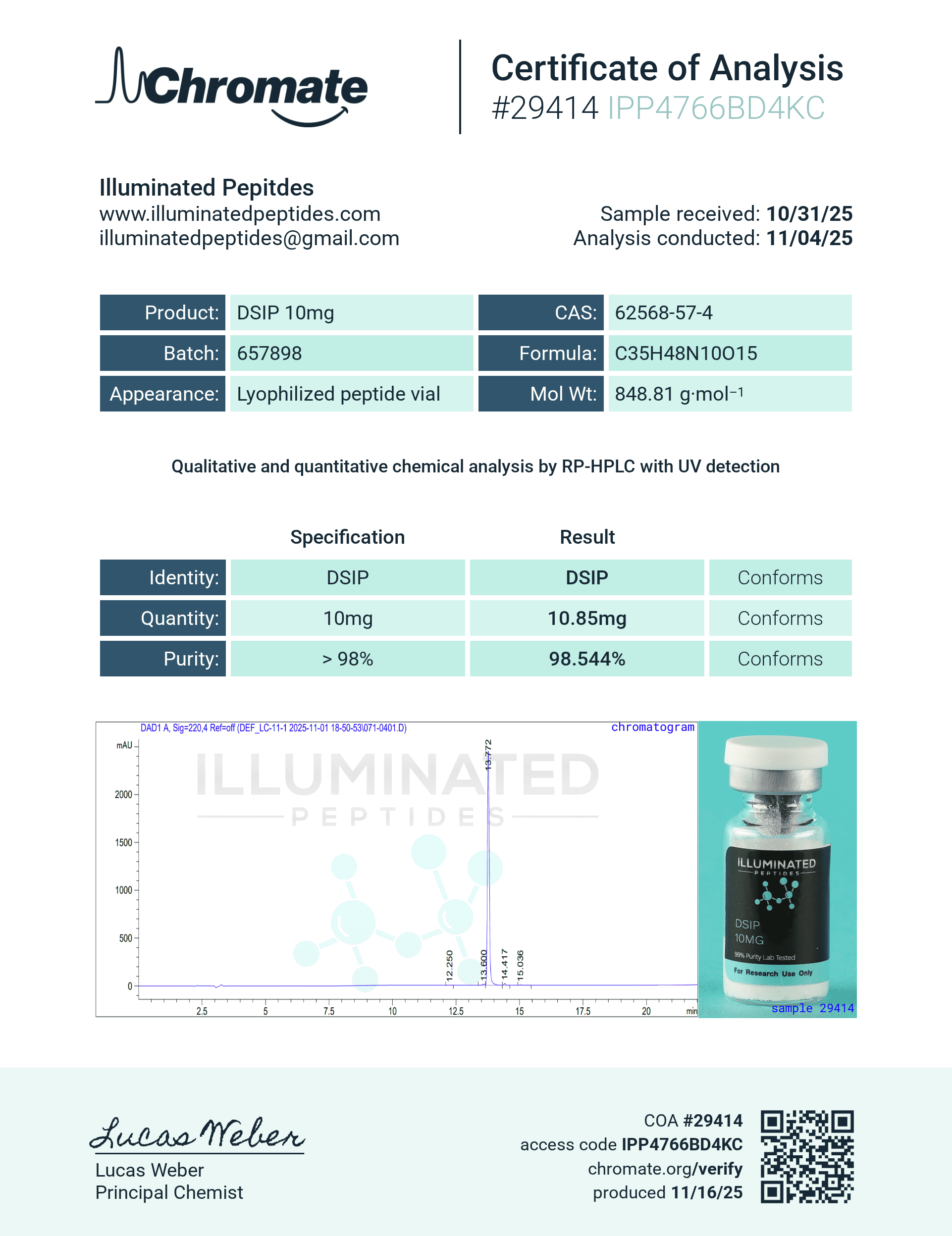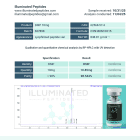Description
What Is DSIP (Delta Sleep-Inducing Peptide)?
Delta sleep-inducing peptide (DSIP) is a naturally occurring nonapeptide that was first identified in 1977 from the brains of rats during periods of slow-wave sleep. It was originally named for its ability to influence sleep cycles in animal studies. Beyond its connection to rest and circadian rhythms, DSIP has drawn research interest for its diverse physiological and endocrine functions. Current findings suggest that DSIP can influence corticotropin regulation, reduce somatostatin secretion, modulate stress responses, help stabilize blood pressure, adjust sleep activity, and affect pain sensitivity. Ongoing investigations also explore its potential roles in areas such as oxidative stress, mood regulation, and neuroprotective mechanisms.
DSIP Structure
Sequence: Trp-Ala-Gly-Gly-Asp-Ala-Ser-Gly-Glu
Molecular Formula: C3H48N100 15
Molecular Weight: 848.824 g/mol
PubChem CID: 68816
CAS Number: 62568-57-4
Synonyms: Emideltide, DSIP nonapeptide, Deltaran
DSIP Research
The Relationship of DSIP to Sleep
Although its name implies a strong connection to sleep, the exact role of DSIP in regulating sleep cycles has proven difficult to define. Early animal studies suggested that DSIP influenced slow-wave sleep and reduced paradoxical sleep, but follow-up investigations have produced mixed results. In some cases, DSIP enhanced deep sleep, while in others it produced little to no measurable effect. Certain findings indicate that DSIP may initially cause arousal in the early stages of rest followed by sedative effects later, suggesting a possible role in balancing or stabilizing disrupted sleep cycles.
One of the more notable areas of study has focused on DSIP in relation to chronic insomnia. Research in this context indicates that DSIP may help improve sleep patterns to more closely resemble those of healthy individuals. Studies in this field suggest that DSIP can support better sleep structure, shorten the time it takes to fall asleep, and increase overall efficiency of sleep, though the magnitude of these changes remains modest. Despite conflicting data, subjective measures consistently reveal that individuals report feelings of sleepiness, longer sleep duration, and quicker sleep onset with DSIP. Interestingly, electroencephalographic recordings often do not fully align with these subjective reports, raising questions about the tools used to measure sedation. As a result, DSIP may serve as a valuable model for reassessing how natural sleep is studied in controlled settings, potentially helping researchers refine our understanding of one of the body’s most complex processes.
DSIP Research and Chronic Pain
Managing chronic pain is challenging, as standard medications such as anti-inflammatory drugs and opioids often carry risks when used for extended periods. These treatments are typically suited for acute pain rather than long-term discomfort, leading researchers to investigate alternative strategies. DSIP has been studied in small pre-clinical trials where it demonstrated the ability to reduce the perception of pain while simultaneously supporting improvements in mood. Additional findings suggest that DSIP may influence withdrawal responses in cases where subjects are dependent on traditional pain medications, potentially reducing rebound pain symptoms that arise during discontinuation. While early in its investigation, this line of research highlights DSIP as an interesting candidate for further exploration in the field of chronic pain biology.
Research in rats suggests that DSIP acts on central opioid receptors to produce its analgesic effects. It isn’t clear if these are direct or indirect effects, but the peptide produces a significant pain-relieving effect that is dose dependent . There is no indication that DSIP produces the kind of dependency that opiate medications do despite the fact that both work on the same receptors in the central nervous system.
DSIP Research and Metabolism
Studies in laboratory animals suggest that DSIP interacts with central opioid receptors in producing its analgesic-like properties. It remains unclear whether these outcomes are mediated directly or indirectly, but findings consistently show a measurable pain-modulating effect that varies with dosage. Importantly, DSIP does not appear to generate the same type of dependency observed with opioid-based agents, despite some overlap in receptor pathways within the nervous system.
Research also points to DSIP influencing stress-related metabolic disturbances that shift mitochondrial respiration from oxygen-dependent to oxygen-independent pathways. This shift typically leads to inefficient energy production and increased toxic byproducts. Evidence indicates that DSIP can help sustain oxidative phosphorylation, even in conditions of reduced oxygen, suggesting it may mitigate cellular damage during periods of oxygen deprivation. By supporting normal mitochondrial activity, DSIP could potentially reduce metabolic injury and preserve tissue stability until circulation is restored.
Such properties highlight DSIP’s potential role as a regulator of oxidative balance at a fundamental cellular level. By sustaining mitochondrial function, the peptide appears to reduce free radical formation. This antioxidant-like activity makes DSIP a candidate of interest in ongoing experimental research, though further study is necessary to clarify the extent and mechanisms of these effects.
Depression, Chemical Imbalances, and DSIP
The discovery that DSIP modifies mitochondrial responses in low-oxygen environments prompted investigations into its influence on neurotransmitter systems. Findings show that DSIP can affect enzymes such as monoamine oxidase type A (MAO-A) as well as serotonin levels, which are both central to neurochemical regulation. These results suggest a possible link between DSIP activity and processes connected to mood regulation, providing an interesting direction for research on the biological underpinnings of depression.
Examinations of cerebrospinal fluid in individuals with major depressive symptoms have revealed altered concentrations of DSIP compared to healthy controls. Given the well-established association between sleep cycles and mood, researchers propose that DSIP’s involvement in sleep regulation could intersect with pathways tied to depressive states. While no attempts have yet been made to apply DSIP directly to depression management, studies indicate its levels are associated with hypothalamic-pituitary-adrenal activity, raising further questions about its connection to stress responses and behavioral outcomes.
DSIP Research in Withdrawal and Addiction
Studies exploring the potential of DSIP in alleviating withdrawal effects during alcohol and opiate detoxification indicate that the peptide could provide notable research benefits. In one trial involving 107 subjects experiencing alcohol or opiate withdrawal symptoms, 97% and 87%, respectively, exhibited either full resolution of withdrawal manifestations or significant improvement. Interestingly, opiate withdrawal appeared more resistant to intervention, requiring multiple DSIP administrations over an extended period for observable effects. Withdrawal, particularly from alcohol, remains a complex research challenge, making any findings in this area scientifically valuable.
DSIP Research and Cancer Prevention
Much of cancer research traditionally centers on treating established disease, but a growing body of research investigates strategies for prevention. Many studies focus on stimulating the immune system to recognize and eliminate malignant cells before tumor development occurs. Experimental data in murine models suggest that DSIP may offer preventive effects superior to some experimental cancer vaccines. In one study, female mice received DSIP over five consecutive days each month beginning at three months of age and continuing until natural death. Treated animals demonstrated a 2.6-fold reduction in tumor incidence, accompanied by a 22.6% decrease in chromosomal abnormalities within bone marrow cells, suggesting potential protective cellular effects.
DSIP Being Tested as Cancer Adjuvant
Chemotherapy research has documented central nervous system (CNS) alterations as a frequent side effect, including motor impairment, behavioral changes such as depressive-like activity, and language deficits. Juvenile models are particularly susceptible to these CNS changes during treatment. Emerging studies indicate that DSIP may modulate these CNS effects by improving blood flow to the brain. Animal research shows that DSIP, or its analog Deltaran, enhances cerebral perfusion under stress conditions like ischemia or chemotherapy-induced metabolic challenge. In one animal study, subjects receiving Deltaran survived at higher rates compared to controls (100% vs. 62%), supporting the potential for DSIP to promote neuronal resilience and mitigate metabolic damage.
Potential Broader Physiological Roles of DSIP
Initially identified in rabbit brains during slow-wave sleep, DSIP is linked to sleep regulation and CNS modulation of sleep-wake cycles. However, its synthesis site remains unknown, and DSIP levels are equally abundant in peripheral tissues, suggesting functions beyond sleep regulation. Some researchers hypothesize that DSIP may act as a hypothalamic peptide with broader physiological roles, similar to how growth hormone influences more than just tissue growth. For instance, studies show DSIP inhibits somatostatin, a protein in muscle cells that suppresses muscle development, potentially promoting skeletal muscle hypertrophy and hyperplasia in animal models. These findings challenge the notion that DSIP’s primary role is sleep-related, prompting speculation about its wider impact on physiological processes.
Further evidence from animal studies suggests DSIP influences blood pressure, heart rate, thermoregulation, and the lymphokine system, with some effects observed independently of sleep onset. These findings indicate DSIP may modulate physiological states in preparation for sleep or other systemic functions.
DSIP demonstrates minimal side effects and good subcutaneous bioavailability in mice, though mouse dosages do not scale to humans. DSIP available at Peptide Sciences is strictly for educational and scientific research purposes, not for human use. Only licensed researchers should purchase DSIP.








